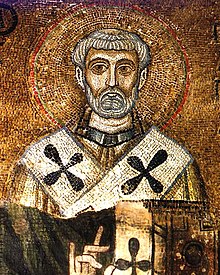
Back Pous Clemens I Afrikaans Clemens von Rom ALS Climent I AN كليمنت الأول Arabic القديس كليمنت الاول ARZ Papa Clemente I AST I Klement Azerbaijani Clemens vo Rom BAR Клімент I Byelorussian Клімэнт I (папа рымскі) BE-X-OLD
Clement I | |
|---|---|
| Bishop of Rome | |
 c. 1000 portrayal at Saint Sophia's Cathedral, Kyiv | |
| Church | Early Church |
| Papacy began | 88 AD |
| Papacy ended | 99 AD |
| Predecessor | Anacletus |
| Successor | Evaristus |
| Orders | |
| Consecration | by Saint Peter |
| Personal details | |
| Born | c. 35 AD |
| Died | 99 AD (aged 63-64) Chersonesus, Taurica, Bosporan Kingdom |
| Sainthood | |
| Feast day |
|
| Venerated in | |
| Attributes |
|
| Patronage |
|
| Shrines | Basilica di San Clemente, Rome St Clement's Church, Moscow Diocesan Shrine and Parish of St. Clement, Angono, Rizal, Philippines |
| Other popes named Clement | |
Clement of Rome (Latin: Clemens Romanus; Ancient Greek: Κλήμης Ῥώμης, romanized: Klēmēs Rōmēs) (c. 35 AD – 99 AD), also known as Pope Clement I, was a bishop of Rome in the late first century AD. He is considered to be the first of the Apostolic Fathers of the Church,[2] and a leading member of the Church in Rome in the late 1st century.
Little is known about Clement's life. Tertullian claimed that Clement was ordained by Saint Peter.[3] Early church lists place him as the second or third [4][a] bishop of Rome. Eusebius, in his book Church History mentioned Clement as the third bishop of Rome and as the "co-laborer" of Paul.[5] In Against Heresies, Irenaeus describes Clement as the successor to Anacletus (third bishop of Rome), and a personal acquaintance of the Apostles.[6] According to the Annuario Pontificio, Clement was the fourth bishop of Rome, holding office from 88 AD to his death in 99 AD. It is likely that Clement died in exile, and was possibly martyred. According to apocryphal stories dating back to the 4th century by authors such as Rufinus, Clement was imprisoned by Roman Emperor Trajan, and was executed by being tied to an anchor and thrown into the sea.[2][7] The Liber Pontificalis states that Clement died in Greece in the third year of Trajan's reign, or 101 AD.
The only known genuine extant writing of Clement is his letter to the church at Corinth (1 Clement) in response to a dispute in which certain presbyters of the Corinthian church had been deposed.[4] He asserted the authority of the presbyters as rulers of the church because they had been appointed by the Apostles.[4] His letter, which is one of the oldest extant Christian documents outside the New Testament, was read in the church at Corinth, along with other epistles, some of which later became part of the Christian canon. This letter is considered to be the earliest affirmation of the principle of apostolic succession. A second epistle, 2 Clement, was once controversially attributed to Clement, although recent scholarship suggests it to be a homily by another author.[4] In the pseudo-Clementine Writings, Clement is the intermediary through whom the apostles teach the church.[4]
Clement is recognized as a saint in many Christian churches and a patron saint of mariners. He is commemorated on 23 November in the Catholic Church, the Anglican Communion, and the Lutheran Church. In Eastern Orthodox Christianity his feast is kept on 25 November.[8]
- ^ "Patron Saints and their feast days". pamphlets.org.au. Archived from the original on 22 June 2015. Retrieved 15 June 2015.
- ^ a b Chapman, Henry Palmer (1908). . Catholic Encyclopedia. Vol. 4.
- ^ Tertullian (1722) [ca 199]. "32". De Praescriptione Haereticorum [Tertullian's Prescription Against Heretics]. Translated by Betty, Joseph. Oxford: The Theatre.
The Church of Smyrna produceth her Polycarp placed there by St. John; The Church of Rome has her Clemens placed there by St. Peter....
- ^ a b c d e Cross, Frank Leslie; Livingstone, Elizabeth A. (2005). "Clement of Rome, St". The Oxford Dictionary of the Christian Church. Oxford University Press. p. 363. ISBN 978-0-19-280290-3.
- ^ Roberts, Alexander; Donaldson, James (1885). Nicene and Post-Nicene Fathers: Series II. Vol. I (1st ed.). Church History of Eusebius, Book III, Chapter IV, 10.
- ^ Irenaeus. "Book III, Chapter 3". Ante-Nicene Fathers Vol. I.
- ^ Tyrannius Rufinus (2024) [406]. "The Martyrdom of Clement - an English Translation". Early Church Texts. Retrieved 30 May 2024.
- ^ "Hieromartyr Clement, Pope of Rome". The Orthodox Church in America. 2024. Retrieved 30 May 2024.
Cite error: There are <ref group=lower-alpha> tags or {{efn}} templates on this page, but the references will not show without a {{reflist|group=lower-alpha}} template or {{notelist}} template (see the help page).